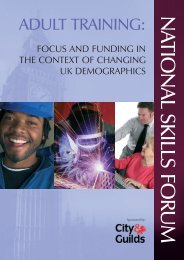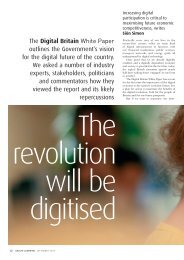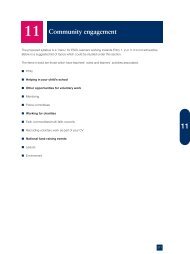Achieve economic well-being - Niace
Achieve economic well-being - Niace
Achieve economic well-being - Niace
You also want an ePaper? Increase the reach of your titles
YUMPU automatically turns print PDFs into web optimized ePapers that Google loves.
<strong>Achieve</strong> <strong>economic</strong> <strong>well</strong>-<strong>being</strong>The Every Child Matters framework defines ‘achieving <strong>economic</strong> <strong>well</strong>-<strong>being</strong>’in the following ways:• Engaging in further education, employment or training on leaving school• Being ready for employment• Living in decent homes and sustainable communities• Having access to transport and material goods• Living in households free from low income• Parents, carers and families are supported to be <strong>economic</strong>ally active
Introduction to ‘<strong>Achieve</strong> <strong>economic</strong> <strong>well</strong>-<strong>being</strong>’Yvonne Cass<strong>well</strong>, Family Learning Strategy Officer,Leicestershire Adult Learning ServiceIt is <strong>well</strong> known that children raised in poverty are more likely to underachieveeducationally and that they often grow up to become <strong>economic</strong>allyunderachieving adults, because they are less prepared for the world of work.We sometimes tend to think of <strong>economic</strong> <strong>well</strong>-<strong>being</strong> as <strong>being</strong> about familyincome alone. However, it is inextricably linked to the other interrelated EveryChild Matters themes. Socio-<strong>economic</strong> disadvantages in families andcommunities create major obstacles to all facets of <strong>well</strong>-<strong>being</strong>.Family learning has the potential to be a catalyst for change in promoting<strong>economic</strong> <strong>well</strong>-<strong>being</strong> in a number of ways. It seeks to reduce social exclusion byproviding free opportunities for <strong>economic</strong>ally disadvantaged families to learn intheir local communities; it utilises the motivation of parents to do their best fortheir children, and provides a non-threatening first step back into learning.Parents gain confidence, motivation and skills and develop their timemanagement skills.Through family learning, parents and carers identify the skills they need todevelop and are motivated to improve their skills and to gain accreditation, oftentheir first successful educational experience.As parents’ confidence increases, so do expectations for themselves and theirunderstanding of how best to support their children’s learning. They haveaccess to information, advice and guidance on other learning opportunities,training or employment, and this helps develop clearer employment andpersonal goals, with a better understanding of how they can achieve these.Family learning is very effective in giving parents/carers the skills andconfidence to apply for and sustain training and jobs in different sectors.Family learning has an impact on whole families: good practice is replicated withother siblings; parents become positive role models, showing how learning canbe fun and rewarding, and creating more positive attitudes to learning.The following examples show how family learning can be powerful in startingparents and carers on their learning journeys, often leading to employment – anaspiration which also maps on to government strategies such as the
80 Introduction to ‘<strong>Achieve</strong> <strong>economic</strong> <strong>well</strong>-<strong>being</strong>’Department for Work and Pensions’ Five Year Strategy for welfare reform, theRefugee Employment Strategy (DWP, 2005b) and the 2005 Skills Strategy (HMGovernment, 2005a). In the short term they may find work, move to a better job,gain voluntary work experience or take up further learning. In the medium term,family learning raises aspirations for parents/carers and their children. In thelong term, it helps to break the cycle of disadvantage.
Economic <strong>well</strong>-<strong>being</strong>: changingprospectsYvonne Cass<strong>well</strong>, Family Learning StrategyOfficer, Leicestershire Adult LearningServiceConnecting with schoolsIn Leicestershire, we target our Family Literacy, Language and Numeracy(FLLN) work in communities with high levels of deprivation, recruiting adultswith few or no qualifications. Our tutors work with schools where the parents’skills needs are apparent and all the school staff recognise the benefits offamily learning and are committed to ensuring its delivery. Here, we explore thework we are doing with one such school – Westfield Infants School in Hinckley.At Westfield Infants School, we deliver FLLN in ‘Keeping Up With The Children’-style courses. The initial 6-week (12-hour) courses are often extended forlearners to explore the curriculum in greater depth and to prepare for nationaltests in literacy and numeracy. The programmes are advertised through fliersand letters from the head teacher, but the understanding and support from allthe school’s staff are instrumental in positively encouraging those parents, whowould most benefit, to attend.A Saturday open day during National Family Learning Week in October hasproved to be an effective way of recruiting parents. The morning starts with abreakfast and ends with an entertainer. We provide literacy and numeracyworkshops for parents along with other activities and displays.Programmes are held in the community centre adjacent to the school fordaytime classes, and in the school itself for evening programmes. We giveparents resources to use with their children at home, as <strong>well</strong> as homework toencourage them to work independently to improve their skills, or to try out withtheir children.
82 Economic <strong>well</strong>-<strong>being</strong>: changing prospectsMarion, the Family Learning Tutor, is an accepted and valued member of theschool team, visiting frequently to ensure she is familiar with curriculum andschool issues, and attending open evenings and parents’ evenings to promotethe work jointly with school teachers. Jill MacLauchlan, the headteacher ofWestfield Infants School, encourages a whole school approach to parentalinvolvement, and Marion works closely with the school staff to develop andprovide the programmes.The initial self-assessment tool, linked to parents’ understanding of the NationalLiteracy and Numeracy Strategies identifies learners’ starting points whilediagnostic assessment identifies more specific targets. A ‘Potted History’ activitygives information about their past experience of education.During the weekly sessions, Marion links the topics to the children’s curriculum,starting with Reception and working through Key Stage1 to Key Stage 2. Sheencourages interaction and discussion and the programmes are learner-led.Sessions are fun, with time to explore difficulties, ‘no one is rushed’, andindividual tutorials are offered at the end of the sessions.The programmes give parents the opportunity to develop their literacy, languageand numeracy skills, to get up-to-date with new methods and vocabulary, and tounderstand how to support their child. They give a real chance to gainconfidence in a school environment, share ideas with others, discuss issueswith teachers and to think about how to apply their learning in other settings.The programmes end with a celebration assembly, where parents receiveattendance certificates and goody bags. All parents in the school are invited toattend these assemblies, helping with recruitment for future courses.Our family learning tutors link with Nextstep advisers, inviting them to theirgroups, and are able to provide information on other programmes and otherproviders. Some learners move on to further Skills for Life provision to gainLevel 2, some move on to FE colleges and take courses such as NVQ2/3‘Childcare and Learning Development’ and ‘Classroom Assistant’ courses.Other learners, such as Sally, have progressed from family learning to find anew career.As a single parent with two primary school boys, Sally re-started her learningjourney through attending ‘Keeping Up With The Children’ numeracy andliteracy programmes. Her initial motivation for attending was to help and supporther children’s learning.
Economic <strong>well</strong>-<strong>being</strong>: changing prospects 83She sat and passed Adult Literacy Level 2 and also discovered a talent for Art.She and the rest of the group were privileged to have their paintings exhibited inthe local library.Through further family learning, Sally gained key skills accreditation and a placeat De Montfort University on a one year’s Access course to study Mathematicsand ICT. Although she was unable to draw on financial assistance, she wasundaunted, and received her graduation certificate at the end of the year. Shewas offered the opportunity to study for an HND qualification, but decidedagainst it, as she wanted to begin a career and to be ‘off benefits’.Following further family learning and guidance from our Nextstep advisers, Sallydecided to become a plumber. She was accepted on the course – the onlyfemale in a group of fifteen men. She gained her qualification, and succeededin finding a placement as a trainee with an experienced local plumber (whichmany people struggle to find.)Through family learning, Sally achieved her goal – ‘to get off benefits and havea full-time career’:‘Going back to learning has completely changed my life for the better, not onlybecause I am working, but that I have something to offer now. I also feel that Iknow a lot more about me as a person than I did before. I feel complete’As <strong>well</strong> as moving on to further learning and to employment, learners alsobecome more involved with school activities, thereby helping to generatepositive attitudes to learning in their children. Westfield Infants School runs asuccessful ‘Right to Read’ (R2R) programme, and 15 of the current 19volunteers on the programme are ex-family learning learners. The R2Rconsultant is impressed with the number of parent/carer volunteers at theschool and has asked to share this good practice with other schools.The school staff recognise the value of family learning to both parents/carersand their children. They report parents’ increased confidence in supporting theirchildren with maths homework and using current calculation strategies, as <strong>well</strong>as increased use of games that support phonics and literacy for all children, butparticularly for those on the SEN record. Comments in home/school readingcontact books show more specific understanding of the reading process andteachers also report improved relationships between children and R2Rvolunteers.
84 Economic <strong>well</strong>-<strong>being</strong>: changing prospectsManaging the provisionIn 2003, we appointed five Family Learning Development Tutors to developFLLN. These tutors are based in the county working in areas of highdeprivation. Tutors build links with local schools and negotiate programmes tosuit learners’ and schools’ needs. We work with the Primary Strategy team ofLeicestershire County Council who can advise on curriculum issues, and wehave a team of community development workers who work in targeted wards toidentify community needs. This information, along with the statistical data,informs the location and style of delivery.The Family Learning Strategy Officer manages the FLLN provision. The FamilyLearning Development Tutors form the core of the delivery team, together withSkills for Life and ESOL sessional tutors. The team meets on a monthly basis toshare good practice, develop the curriculum and discuss on-going issues. Thetutors who are based in various locations across the county maintain additionalregular contact through email, shared training, visits and meetings.The Family Learning Strategy Officer works closely with the Skills for LifeStrategy Officer, as there are many common training, resource and progressionissues. We also work with other officers and senior managers withinLeicestershire Adult Learning Service to develop a coherent strategy for adultlearning development and provision in the county. Family learning links to theother significant strands of adult learning delivery, namely employability andwidening participation in communities of high deprivation. We constantly reviewand prioritise areas for development, for example our recruitment strategy withthe aim of involving more men in FLLN.The greatest challenge for our service has been to raise the profile of FLLNwithin Children’s Services and to demonstrate the benefits of FLLN in raisingchildren’s achievement and fostering positive attitudes to learning. Tutors spendtime building and maintaining relationships with schools, but other issues, suchas change of school staff, Ofsted inspection or refurbishment can lead topostponement. Additional work is needed to engage new parents where theprogrammes are not firmly established. We have found that the most importantingredient in success or otherwise of a programme is the understanding andcommitment of the head teacher, and through him/her, other key school staff.
Economic <strong>well</strong>-<strong>being</strong>: changing prospects 85Cameo 17: Lancashire Adult LearningThe Adult College, Lancaster has developed a family learning programme insome of Fleetwood’s areas of high deprivation. The programme wasdeveloped as a pilot in two primary schools. Initial contact with parents wasthrough either a 12-hour ‘Keeping Up With the Children’ course or a 12-hourprogramme looking at the role of parents in school. The majority of thelearners, both parents and grandparents, had left school with noqualifications and had negative experiences of their own schooling. Familylearning provided the first opportunity for them to return to learning, andmany progressed to further FLLN or Skills for Life programmes (some ofwhich were specially set up in a local community centre) and to achieve Level1 and Level 2 adult literacy and numeracy certificates.The college also runs workplace NVQ programmes for teaching assistantsand this has enabled parents from FLLN programmes, who are interested inworking in schools, to progress on to either a VQ or NVQ for teachingassistants. This has been particularly enhanced by the introduction of 12-hour ‘Step into Childcare’ VQ as a bridging programme between FLLN andthe NVQ.Mandy Williams, Lancashire Adult LearningCameo 18: Redbridge Institute of Adult EducationSomali families in Redbridge were identified by the local Refugee Forum ashaving a particular interest in developing sewing skills for personal projects,and as needing skills to enhance adults’ employability. Redbridge Institute ofAdult Education’s Wider Family Learning Service, together with the RefugeeForum, developed ‘Sewing for Somali Families’. The course venue and timingwere negotiated to fit in with families as much as possible. The course washeld near the main Ilford shopping centre on alternate Saturday mornings.Families learned how to adapt commercial patterns and cut material andmany used a sewing machine for the first time. The course also helped adultsand children to improve their numeracy skills by taking measurements andmeasuring and estimating fabrics. Budgeting skills were incorporated byfamilies doing their own shopping for material. Language barriers wereovercome by using a volunteer from the Somali Consortium as an interpreter.Adults also improved their English spoken skills and learned new vocabulary.Maria Sotiriou, Redbridge Institute of Adult Education
86 Economic <strong>well</strong>-<strong>being</strong>: changing prospectsCameo 19: Kingston Adult EducationKingston Adult Education Family Learning delivered a ‘Springboard’ course ata local Children’s Centre in July 2006. The 5-session course was designed toattract parent/carers who had been on previous family learning courses at thechildren’s centre as a progression route. It was delivered by two teachers anda local Connexions advisor. Parents were offered one to one advice andguidance sessions where they discussed further learning and employmentopportunities. They were shown how to complete CVs and were givensupport with IT skills. An outreach officer from the Children’s InformationService came to talk to the group about working in childcare and child taxcredits. As a result of this course some parents moved on to further learning,including GCSE English and horticulture, while others moved intoemployment in childcare.Veronica Storey, Kingston Adult Education


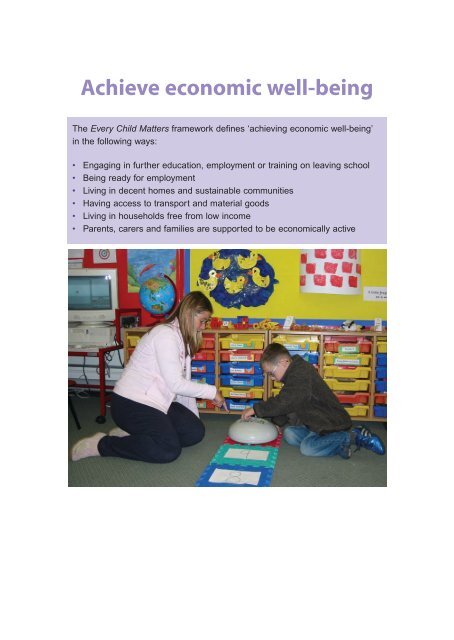
![NIACE Briefing Sheet2: What motivates people to learn [PDF]](https://img.yumpu.com/51410634/1/184x260/niace-briefing-sheet2-what-motivates-people-to-learn-pdf.jpg?quality=85)
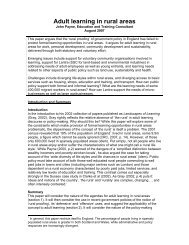
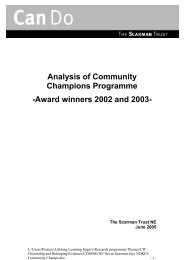
![Section 11: Volunteering and citizenship - [PDF File] - Niace](https://img.yumpu.com/49993701/1/190x255/section-11-volunteering-and-citizenship-pdf-file-niace.jpg?quality=85)

![credit card leaflet - [PDF] - Niace](https://img.yumpu.com/49256644/1/190x245/credit-card-leaflet-pdf-niace.jpg?quality=85)
![NIACE Briefing Sheet 11: Emancipatory Learning [PDF]](https://img.yumpu.com/48109261/1/184x260/niace-briefing-sheet-11-emancipatory-learning-pdf.jpg?quality=85)
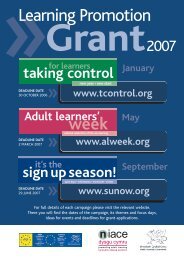
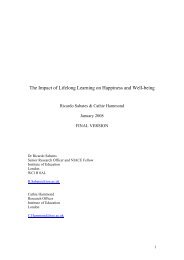
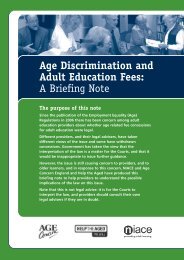
![Ice-breakers and other suggestions for your media club - [PDF] - Niace](https://img.yumpu.com/45206918/1/190x245/ice-breakers-and-other-suggestions-for-your-media-club-pdf-niace.jpg?quality=85)
